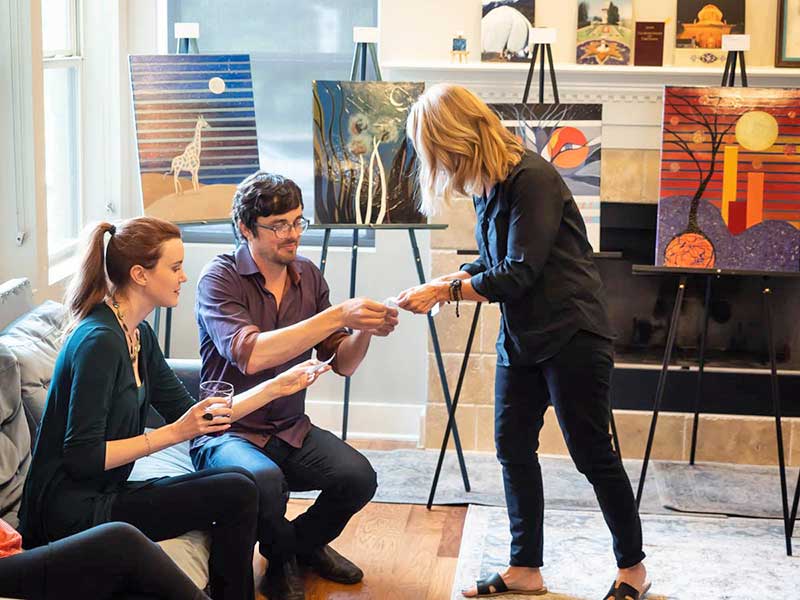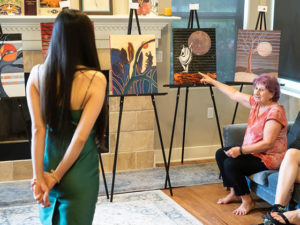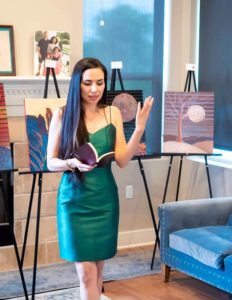





Artist and actor Jacqueline Claire Leal loves to connect people to the Baha’i writings through paintings. So she has begun offering shows in many settings where guests discuss quotations from The Seven Valleys and relate them to her “mystical landscapes.”
“There is something about directly sharing the Writings of Baha’u’llah but in a uniquely personal way — an artist talking about her life and painting — that is proving very approachable and appealing to diverse groups of people,” says Leal, a Baha’i in San Antonio.
People who have had little or no exposure to the Faith are responding positively to this form of engagement, she says. Some of the feedback she has received includes:
Leal’s fellow Baha’is are finding the experience rewarding as well.
“I really didn’t know what to expect, but it really got me reflecting on my life and my path. I actually started crying on the way home. And, yes, you inspired me to start reading The Seven Valleys again. I’m so excited to share that with others,” said one after an event in Austin.
The Seven Valleys is a mystical essay revealed by Baha’u’llah, Prophet-Founder of the Faith, after He had lived two years in seclusion. It follows the path of the soul through different stages of a spiritual journey, from this world to other realms that are closer to God.
Leal invites those attending her shows to take half of a quotation from one of the Valleys — Search, Love, Knowledge, Unity, Contentment, Wonderment, and True Poverty and Absolute Nothingness — and find whoever holds the other half.
It’s an ice-breaking technique Leal has used at her birthday parties, and she says it’s proving just as effective in larger settings.
“Though often [attendees] are in no way familiar with the passages, they always seem to recognize their match,” she says.
At that point the two “become a team,” she says, “and select a painting, from a series of seven mystical landscapes, they feel correlates best with the quote.”


Then Leal weaves those quotes into a fabric of the work as a whole.
“Whether it is a large or small group, it always has a special ‘campfire’ feeling,” she relates, “and I share personal stories and reflections about my experiences and artwork, connecting it all with larger concepts of life as a spiritual journey.”
That leads to an exploration of The Seven Valleys, during which each team is invited to share the artwork it correlated with the quote.
“I can’t explain why exactly. Perhaps it has something to do with people feeling welcomed and valuable from the beginning, or with my personal sharing and stories,” reflects Leal. “But even very shy people almost always engage in this portion.”
What follow are “beautiful, profound and insightful things based on personal understandings of Baha’u’llah’s Words.”
“For example, someone pointed out that ‘seeing the end in the beginning’ as we might in the Valley of Knowledge is a limited human perspective, for there is only God and oneness,” recalls Leal.
“Someone else reflecting on the Valley of True Poverty and Absolute Nothingness pointed out that their family love relationships are so strong that they could have nothing and still feel cared for spiritually. Another pointed out that we as human beings are ‘tiny and cosmic’ at the same time.”


Leal believes attendees’ willingness to freely tap into their inner thoughts “has something to do with a balance of sharing very directly — everyone who attends knows I am Baha’i and that the work we are exploring is a mystical Baha’i text — but also sharing gently in a mode of storytelling and shared wisdom.”
It’s not surprising, then, that many attendees respond warmly to invitations from Leal to engage with Baha’is in other settings, including Baha’i-initiated core activities of community building at the neighborhood level.
“At each event, receptivity has been discovered and some people have started attending regular core activities,” says Leal. “At a university, interest was so high we are planning a regular on-campus interfaith devotional in spring semester.”
Leading her to conclude, “People are open to and actually really want to talk about Baha’u’llah and the Baha’i teachings when they are introduced to the topics and are invited to participate in a way that is engaging and meets them where they are.”◼


![]()
![]()
Whether you are exploring the Bahá'í Faith or looking to become an active member, there are various ways you can connect with our community.
Please ensure that all the Required Fields* are completed before submitting.